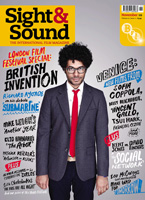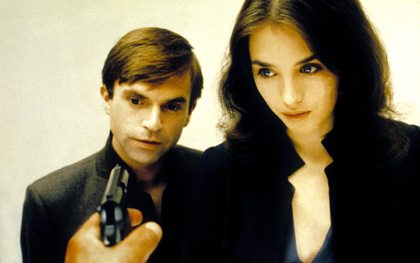Primary navigation


Michael Brooke on one of the most viscerally vivid portraits of a disintegrating relationship ever committed to film
Possession
Andrzej Zulawski; France / West Germany 1981; Second Sight / Region 2; Certificate 18; 119 minutes; Aspect Ratio 1.66:1 anamorphic; Features: documentary, interview, stills gallery (MFB 577)
Andrzej Zulawski’s first and only English-language feature was originally released in the UK in 1982, around a year after its Cannes competition premiere. Though it lost to Man of Iron (by Zulawski’s former mentor Andrzej Wajda), it picked up a best actress award for Isabelle Adjani’s primal shriek of a performance as Anna, whose sudden, unexplained decision to walk out on husband Mark (Sam Neill) jump-starts the rollercoaster that follows.
This cut little ice with the Director of Public Prosecutions, who ludicrously included it on the official ‘video nasties’ blacklist compiled in the wake of one of the more virulent moral panics to which British officialdom occasionally falls prey. While this was undoubtedly a badge of honour for most of its shoddy companions, it did Possession a major disservice, though it’s fitting that a film so full of paranoia, oppression and surveillance (it’s set in Cold War Berlin, Mark’s job seems espionage-related, two detectives meet decidedly sticky ends) should itself fall victim to similarly irrational emotions – and, in the US, severe mutilation, losing more than a third of the original running time. It’s worth noting en passant that the BBFC never had a problem with it, passing it uncut on three separate occasions, including the theatrical release that preceded the legal threats.
Although it’s easy to see why it was pigeonholed as a horror film, its first half presents what is still one of the most viscerally vivid portraits of a disintegrating relationship yet committed to film, comfortably rivalling Lars von Trier’s Antichrist, David Cronenberg’s The Brood and Ingmar Bergman’s Scenes from a Marriage. When Anna leaves, Mark runs the gamut of grief responses, going berserk in a café (crockery-smashing, chair-throwing) before shivering on a bed in a cold sweat as though undergoing cold turkey. After he attempts to assault her combat-trained lover Heinrich (Heinz Bennent), there’s a doomed attempt at reconciliation that sees Mark and Anna take turns to mutilate themselves with an electric carving knife.
Like Bergman and Cronenberg, Zulawski was dealing with very personal demons: he’d just undergone a psychologically traumatic divorce from his first wife, actress Malgorzata Braunek. At one point, Mark sticks a feather down his throat to induce vomiting, and Zulawski seems to have done something similar when conceiving the film, spewing out every raw emotion that he could recall. These are uncomfortable scenes to watch, partly because there’s a child involved (the real-life equivalent of Anna and Mark’s ten-year-old son Bob grew up to be director Xawery Zulawski who, on the evidence of Chaos and Snow White and Russian Red, is very much his father’s son) but mainly thanks to the pervasive impression that Zulawski is grabbing us by the scruff of the neck and rubbing our faces in private grief. The camera constantly tracks and circles the couple as though possessed by a pathological voyeurism – camera operator Andrzej Jaroszewicz achieves effects comparable to the Steadicam work in The Shining but with far more limited resources.
The film’s second half is what earned it lasting notoriety, as it involves Adjani shacking up in a dilapidated apartment to pursue a relationship with a tentacular monstrosity that seems to have erupted from her own id, possibly via a spectacular five-minute freakout in an underpass. In fact, despite its love of human flesh (both living – Adjani’s – and recently killed), the creature is marginally less repellent than the unctuous Heinrich, who still lives with his mother despite apparently being a one-man Kama Sutra. Its precise function is never made clear – a physical embodiment of the notion that the disintegration of the family breeds monsters? A writhing surrogate for the dark and twisted secrets underpinning even the most outwardly healthy marriage? A recurring doppelganger motif (Mark and Anna have clones of unspecified origin, physically identical but temperamentally opposite) is also left unexplained, but Possession is self-evidently far more than just another monster movie. Those prepared to make the leap of faith demanded by Zulawski’s ultra-confrontational, deliriously overwrought, symbol-crammed approach will find the experience, like that of Ken Russell’s equally maligned The Devils, very hard to forget.
While Second Sight’s British DVD premiere doesn’t offer the deluxe packaging lavished by Mondo Vision on other Zulawski films, the disc itself is a pleasant surprise. The grainy transfer is a notch below Mondo Vision’s labour-of-love efforts, but it is at least anamorphically enhanced and correctly framed, and the extras are more substantial than the box blurb’s promise of a ‘making of’ documentary and interview combo would suggest.
Although it lacks the commentary by Zulawski and Daniel Bird included on the old US and current German editions, it includes a lengthy interview with the director and Bird’s superb 50-minute documentary The Other Side of the Wall, which intersperses the history of the production with a great deal of analysis and exploration of the political/historical context (especially the Berlin Wall as a metaphor for the situation in Zulawski’s native Poland at the time), helpful digressions (Zulawski’s earlier films are quoted, as are Enki Bilal’s comic-strip metamorphoses of the Wall), and some great stories. At one point Zulawski even tried to pitch it to Paramount’s Charles Bluhdorn as “a film about a woman who fucks an octopus.” Why this didn’t secure him instant passage to Hollywood fame and fortune is one of film history’s more baffling mysteries.
L’important c’est d’aimer reviewed by Tim Lucas (November 2009)
The wild bunch: 50 mad, bad and dangerous directors, including Andrzej Zulawski (September 2009)
The Squid and the Whale reviewed by Edward Lawrenson (March 2006)
Saraband reviewed by Jonathan Romney (October 2005)
Faithless reviewed by Philip Strick (February 2001)
The Story of Us reviewed by Geoffrey Macnab (June 2000)